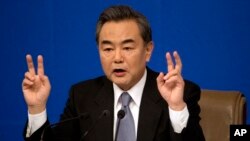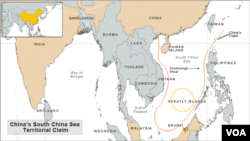China’s Foreign Minister Wang Yi said his country has every right to carry out construction and develop land around disputed islands and reefs in the South China Sea.
Beijing’s actions have raised concerns from the United States and others in the region, but Wang said China will uphold freedom of navigation in the waters and denies the buildup targets anyone.
For months, there have been complaints about China’s activities in the South China Sea. And a few weeks ago, analysis and photos released by IHS Jane’s and the Center for Strategic and International Studies revealed just how far along that effort was.
According to analysis and satellite images, China is building up several reefs it controls that are hundreds of kilometers away from its coast. On one reef, China has brought in so much land that it has created a new island. It has built a helipad on one and an airfield on another.
Construction necessary
However, China’s Foreign Minister Wang Yi said that the construction was necessary and not a sign its policy toward the region was changing. Speaking on the sidelines of parliamentary meetings in Beijing this week, Wang also said the construction did not target or affect anyone.
Wang said China was “not like some countries who engage in illegal construction in another person’s house,” and that Beijing “does not accept criticism from others when we are merely building facilities in our own yard.” He said China had “every right to do things that are lawful and justified.”
China said almost all of the South China Sea is part of its territory and uses a so-called nine dash on its official maps to highlight its claims.
Beijing is not the only one that has claims to islands and reefs in the sea, which is rich in energy resources and crisscrossed by key global shipping lanes
The buildup, analysts said, would make it easier for China to defend its claims and project force.
Still, Wang Yi said China would continue to uphold freedom of navigation in the South China Sea.
He said China “will continue to peacefully resolve disputes through direct dialogue and consultations” and that Beijing “will continue to play a constructive role in maintaining regional peace and stability.”
China’s actions and assertiveness over its territorial claims in both the South China Sea and East China Sea with neighboring Japan are a frequent source of friction.
In addition to a dispute over islands in the East China Sea with Tokyo, Beijing has long been upset with what it sees is Japan's unwillingness to atone for its actions during World War II. The two countries' relations have been strained in recent years, but later this month they will hold their first security talks in four years.
Invitation possible
At the briefing, Wang Yi gave his strongest hint yet that China could invite its wartime enemy Japan to attend a ceremony marking the 70th anniversary of the end of World War II that Beijing will host later this year.
When asked whether Japanese Prime Minister Shinzo Abe would be invited, he told reporters that China would extend invitations to leaders of all relevant countries.
Chinese leader Xi Jinping has breathed new life into Beijing’s foreign policy with an approach that seeks to give China a bigger role in global affairs, one that is equal to its economic status as the world’s second largest economy.
However, his actions at times have raised questions about whether China is seeking to make its own rules and ignore international norms.
Foreign Minister Wang Yi said China did not want to upset the current world order, but it did believe that the current system needed to be updated to give more say to developing countries.
Comparing the United Nations to a boat, Wang said that China was in the vessel together with more than 190 countries and that it did not want to upset the boat, but work together with its other passengers.
At the same time, he added, China wanted to make sure the boat sailed forward steadily and in the right direction.





